
DECADE FESTIVAL
27 - 30 November 1998
Belvedere Technical Teachers College
Harare, Zimbabwe

 |
WCC Eighth Assembly
DECADE FESTIVAL
27 - 30 November 1998 |
 |
 en français
en français  auf Deutsch
auf Deutsch  en español
en español
In 1988 the World Council of Churches launched the Ecumenical Decade of the Churches in Solidarity with Women as a ten-year programme offered to the churches. The Decade was to provide a framework within which WCC member churches could look at their structures, teachings and practices with a commitment to the full participation of women. It was an opportunity for churches to reflect on women's lives in society, and to stand in courageous solidarity with all women.
From the middle of the Decade onwards, ecumenical team visits - "Living Letters" - were sent to the churches around the world to affirm the achievements made and to challenge the churches to move forward in their commitments to women. The "Living Letters" came back with enthusiastic stories about solidarity among women and their love and commitment to the churches. But also about an unfinished agenda - women's many unresolved questions and concerns.
Distilling the findings of 75 team visits to 330 churches, 68 national councils and approximately 650 women's groups, the Living Letters report describes "Life in the Garden" - women who are the pillars of their churches, determined to endure, and forging partnerships with secular groups. It also describes "The Stones" - violence and racism against women, economic injustice, barriers to participation, the role of the family, oppressive theology and interpretations of the Bible, attitudes to sexuality, the gospel-culture connections, and solidarity and divisions between women.
The Living Letters noted, for example, that:
To deal with the violence women experience even within the church is to approach two areas - sexuality and abuse of power - which have always been taboo for the churches. Racism too is a difficult reality to deal with. Yet if the church is an ethical community, then solidarity with women struggling against racism must be seen as part of its sacramental ministry. The globalisation of the market economy is an incredibly huge and complex phenomenon... Yet the ethical challenge to the churches is to affirm and support women's survival strategies. Helping to improve the quality of life in our communities is indeed a liturgical act.
Most discouraging was clear evidence that women are marginalised by their own church structures... All the teams noted women's lack of or limited access to decision-making processes - and thus power - in their churches; and some church leaders insisted that church constitutions cannot be changed. This situation both reflects and promotes a similar imbalance of power in society.
The Living Letters report is available for CHF 8.90 in English, French, German and Spanish from WCC Publications, 150 route de Ferney, PO Box 2100, 1211 Geneva 2, Switzerland. Tel.: +41.22 791 63 79; Fax: +41 22 798 13 46.
What next?
The WCC's Eighth Assembly, to be held in Harare, Zimbabwe, offers an opportunity to reaffirm the changes that have happened in the churches' lives, but also to restate the challenges that yet remain...
The Decade as a project is over. But its agenda is unfinished; it is urgent to challenge the churches and the ecumenical movement to keep up the momentum of their solidarity.
A special plenary session at the Assembly will focus on recommitment to the concerns of the Decade so that the churches and the ecumenical movement continue their actions in solidarity with women. The plenary will highlight the blessings women bring to the churches through their gifts; it will also draw attention to four areas of concern so dramatically highlighted by the Living Letters report:
A Decade Festival
A four-day Decade Festival before the Eighth Assembly will provide a time and place for women to celebrate the end of the Decade and their own struggles and commitments to the church, and to articulate their visions for the church and society beyond 1998. It will give them a chance to reflect on the ways the Decade has had an impact on their lives as they look to the future.
Central events will be:
This hearing will include testimonies of racism, domestic violence, violence in a pastoral situation and within a congregation, as well as of the theological silencing of women's voices, and of structural violence against women in the churches. It will give an account of positive actions for change initiated by the churches, and by women responding to violence.
The hearing will take place in a context of pastoral care and compassion, making visible the commitment of all the women and men gathered together at the Festival to struggle against the violence women experience.
Global ecumenical sister organizations like the World Day of Prayer, Fellowship of the Least Coin, World Young Women's Christian Association and many others will also be able to share information about their work.
In addition to the issue- and action-oriented huts, there will also be a "quiet hut" for mediation and prayer.
The exhibition will be displayed both at the Festival and at the Assembly. Later it will be made available to members of the ecumenical movement as a portable exhibit.
Women all over the world fear that the end of the Decade as a project will mean that programmes and projects addressing women's struggles will slow down and that the diminishing funds of churches and the ecumenical movement will mean less work with women. This cannot be! The Festival and the Assembly must keep this commitment alive!
Thus, the Festival will celebrate the gifts and commitments of women but also point to the need for continued solidarity. A document on "Women's Challenges: Into the 21st Century" has been shared with women around the world, will be further discussed during the Festival, fowarded to the Assembly and, from there, to the churches. It calls for continued monitoring so as not to lose the momentum created by the Decade and sets out an action agenda for the churches and the WCC.
What the teams discovered
Women are a majority in most congregations and participate strongly in the spiritual and liturguical life of the church. They are active in parish life through a wide variety of lay ministries - diakonia, fund-raising, teaching and counselling. They gain strength and satisfaction from all these kinds of participation even if their contribution is not always recognized and they are unable to attain leadership in these areas.
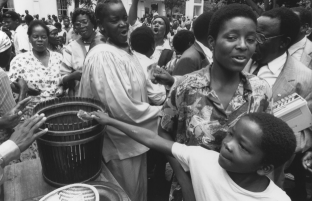
Offering after outdoor worship at a Methodist Church in Mozambique.
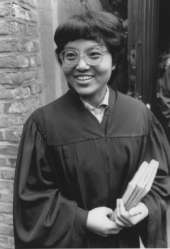
Woman theology student, Shanghai... we could not help being struck by the evidence that almost everywhere boys are still socialized to dominate and girls to be subservient, and by the number of times "culture" was used to explain or justify violence against women. Whether cited as a pretext or not, culture is frequently at the root of ill treatment of women, and only rarely is it challenged by men in the churches.
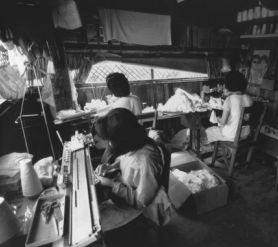
Filipino garment sweatshop workers.
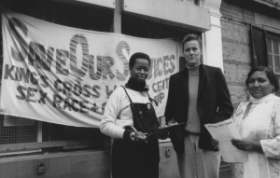
A London women's centre fighting for an end to
discrimination on grounds of sex, race and class.
It will conclude with a challenge to the churches to make more concrete their pastoral and solidarity actions beyond 1998, and to the WCC to set up a credible global programme to respond to the above issues.
░ Women and racism
░ Ecology/creation
░ Women and theology
░ Women and economic justice
░ Women as peacemakers
░ Violence against women
░ Uprooted women (refugees and migrants)
░ Young women
░ Women and diakonia
░ Women and health
░ Women and children.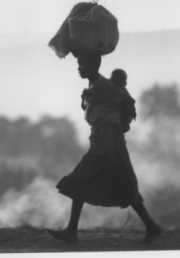
Having fled slaughter at home, this
Rwandese woman and thousands like
her faced more danger in
refugee camps. (Tanzania, 1994)
Beyond 1998
 Click here to "Women's Challenges: Into the 21st Century".
Click here to "Women's Challenges: Into the 21st Century".
We hope that 1200 people - 100 men and 1100 women - will take part in the Festival. Of these, 1000 (including some official delegates - women and some men - to the Assembly) are to come from the regions. There is a quota for each region: 200 for Africa, 170 for Asia, 50 for the Caribbean, 200 for Europe, 80 for Latin America, 100 for the Middle East, 175 for North America, and 50 for the Pacific.
Please note that:
Who can participate in the Decade Festival?
|
Women's Programme All Africa Conference of Churches P O Box 14205 Nairobi, Kenya Phone: + 254 2 44 14 83 Fax: + 254 2 44 32 41
Women's Concerns Programme
Women's Desk
Ecumenical Decade
Ecumenical Decade Coordinating Group |
Women's Desk Latin American Council of Churches (CLAI) Avenida 12 Calles 13 y 15 Apartado 62 1002 San JosÚ, Costa Rica Phone: (+506) 25 70 989 Fax: (+506) 28 50 300 E-mail: pfmnclai@sol.racsa.co.cr
Women's Programme
Women's Desk
Women's Programme |
We need your help to fund the Festival!
The Festival itself needs to be funded! Any personal contributions will be welcome! For more information, please write to the Women's Programme of the WCC at the address below.
In addition, many would-be participants cannot afford to come to the Festival. So we are also seeking funds to cover travel, particularly from those parts of the world where funding is difficult to obtain.
Not everyone who has kept the Decade alive in their region can participate in the Festival. If you are unable to attend, you may be able to help someone else to come! If so, please send your contribution to the WCC Women's Programme, or directly to the regional ecumenical office in your region (addresses above). There has also been a suggestion that women who are frequent flyers could contribute their bonus travel miles to the travel of other women. If you'd like to contribute in this way, please let the Festival Office know.
Good quality reproductions of the photos accompanying this text are available via Internet or ordinary mail. For information on our fees and/or to order, please go to our Photo Oikoumene site, or send an E-mail inqiry to photo. Please quote the following references:
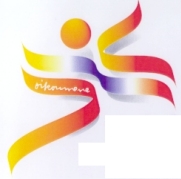
The Women's Programme
Unit III - Justice, Peace and Creation
World Council of Churches
PO Box 2100
1211 Geneva 2, Switzerland
Phone: (+41 22) 791 6213
Fax: (+41 22) 791 0361
E-mail: Contact us"
 Back to list of Assembly materials
Back to list of Assembly materials
 Back to WCC homepage
Back to WCC homepage
░ Mozambique church service (5616-25A)
░ Shanghai theology student (3928-25A)
░ Filipino garment workers (4288-18A)
░ Rwandese refugee (6037-17A)
░ Kings Cross centre (4180-12A)